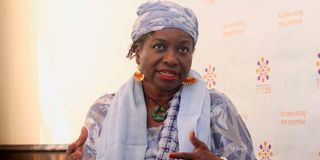Togo tops in population of men, boys opposing FGM

UNFPA Executive Director Dr Natalia Kanem at a past media consultative meeting. She says men and boys are powerful allies in the effort towards ending FGM.
What you need to know:
- Today, the world marks International Day of Zero Tolerance under the theme ‘Partnership with men and boys to transform social and gender norms to end female genital mutilation’.
- The United Nations says more than 200 million girls and women alive today have undergone FGM.
- FGM is also practiced in some countries in Asia and Latin America.
There is hope of ending female genital mutilation (FGM) as majority men who are the custodians of traditions chaining women to the harmful cultural practice, oppose its continuation.
Today, the world marks International Day of Zero Tolerance under the theme ‘Partnership with men and boys to transform social and gender norms to end female genital mutilation’. This is a rallying call aimed at encouraging men and boys to cooperate with women in eliminating the practice that leaves women and girls with lifetime physical, mental and psychological scars.
A 2022 analysis by United Nations Children's Fund (Unicef) on perceptions of both genders on abolishing FGM has established that in countries where data is available, 63 per cent of boys and men oppose the continuation of the practice in their communities. While 67 per cent of girls and women do the same.
In a joint statement on this year’s commemoration by United Nations Population Fund (UNFPA) Executive Director Dr Natalia Kanem and Unicef Executive Director Catherine Russell, they point out men and boys as powerful allies in the effort towards ending FGM.
Harmful practice
They honour the men for increasingly “challenging power dynamics within their families and communities and supporting women and girls as agents of change.”
According to the United Nations more than 200 million girls and women alive today have undergone FGM. Although the practice is primarily concentrated in 30 countries in Africa and the Middle East, it is also practiced in some countries in Asia and Latin America; and among immigrant populations living in Western Europe, North America, Australia and New Zealand.
Here is a global outlook of men and boys’ opposition to the continuation of the harmful practice.
Togo has the highest population of men and boys opposing FGM at 96 per cent.
The country saw a huge decline in the FGM cases in 13 years, dropping from 50 per cent in 1993 among women and girls aged 15-49 years to 5.8 per cent in 2006. This means the new cases went down by 44.2 per cent.





